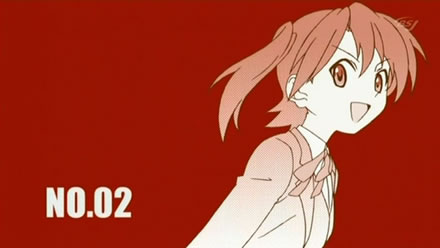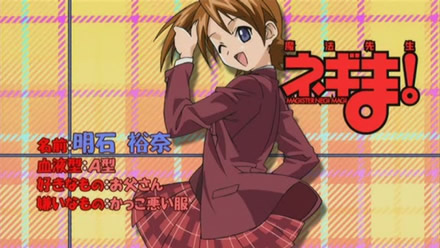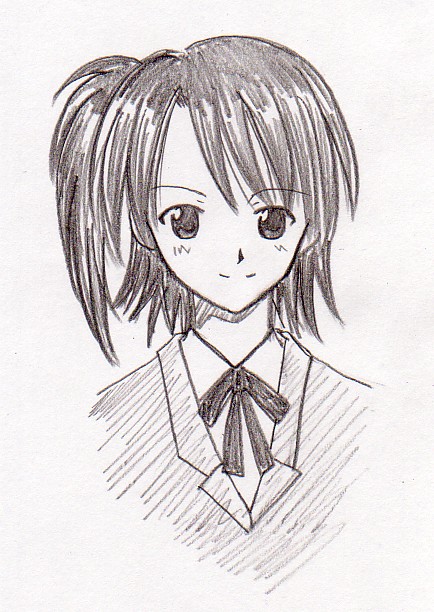Today I've come across some really interesting things while translating Negima!? and I realized that, hell, I don't think we can live without this eh. Well what's it? Well you guessed right. It's how Japanese people pronounce their dates. Ever wondered how you wanna impress a Japanese girl by telling her your birthday in Japanese? Or even your horoscope? Well, this post is all about that.
Alright. First of all, we need pictures to keep you guys awake. Today's host will be Akashi Yuuna! Seat No.2 from Class 2-A in Akamatsu-sensei's series Mahou Sensei Negima!
In Japanese, years are pronounced the same way they are pronounced as values. Thus if I were to say "year 2000" I'd say 二千年 (nisennen). Which is pretty easy. So if you know how to count to the thousands, this should be a piece of cake.
Modern Japanese names for months literally translate to "first month", "second month", etc... And they are written the same way as in Modern Chinese too. So for those of you who are Chinese, you already know the kanji. Just practice the pronunciations.
January 一月 いちがつ (ichigatsu)
February 二月 にがつ (nigatsu)
March 三月 さんがつ (sangatsu)
April 四月 しがつ (shigatsu)
May 五月 ごがつ (gogatsu)
June 六月 ろくがつ (rokugatsu)
July 七月 しちがつ (shichigatsu)
August 八月 はちがつ (hachigatsu)
September 九月 くがつ (kugatsu)
October 十月 じゅうがつ (juugatsu)
November 十一月 じゅういちがつ (juuichigatsu)
December 十二月 じゅうにがつ (juunigatsu)
These months also have traditional names, which are still in use today in poetry. Most people use the modern versions in daily speech though. I will talk about those traditional names a bit later.
Okay, here comes the tricky part. Now that we know how to say years and months in Japanese, we need to know how to say which day of the month it is. The Japanese, oddly, don't have a very systematic way of pronouncing days of the month, but a general guideline can be followed. If you want to pronounce any day above 10, it can be pronounced with the number followed by a -nichi suffix. In other words, 11th July is rokugatsu juuichinichi, 12th is juuninichi, 13th is juusannichi. This however, does not apply to the ones which end with a four. Thus, 14th is juuyokka. 24th is nijuuyokka. As for 1 to 10 and 20, you gotta memorize them. Unfortunately.
一日 (tsuitachi)
二日 (futsuka)
三日 (mikka)
四日 (yokka)
五日 (itsuka)
六日 (muika)
七日 (nanoka)
八日 (youka)
九日 (kokonoka)
十日 (tooka)
十一日 (juuichinichi)
十二日 (juuninichi)
十三日 (juusannichi)
十四日 (juuyokka)
十五日 (juugonichi)
十六日 (juurokunichi)
十七日 (juushichinichi)
十八日 (juuhachinichi)
十九日 (juukunichi)
二十日 (hatsuka)
二十一日 (nijuuichinichi)
二十二日 (nijuuninichi)
二十三日 (nijuusannichi)
二十四日 (nijuuyokka)
二十五日 (nijuugonichi)
二十六日 (nijuurokunichi)
二十七日 (nijuushichinichi)
二十八日 (nijuuhachinichi)
二十九日 (nijuukunichi)
三十日 (sanjuunichi)
三十一日 (sanjuuichinichi)
These are all the days that you have to remember. Easy right? thought so. Those of you who are Chinese will notice another similarity. Its kanji is written the same in Chinese! (God it's a good time to be Chinese) . Just kidding ^_^; Now, time to put it all together.
Alright. So now that we know how to say the month, year and day, now lets practice saying dates in Japanese!
Let's start with my birthday, coz I wrote this article ^_^;. It's on the 7th May 1985, so I'd say:
誕生日は 五月七日です。
tanjoubi wa gogatsu nanoka.
"tanjoubi" means birthday. Thus, I'm saying my birthday is on the 7th of May! Since 7th is nanoka and May is gogatsu.
Lets have a bit more practice. Say I want to do something on New Year's Day. That's the 1st January if you are an alien. Since 1st is tsuitachi and January is ichigatsu, I would then say,
一月一日何かやりませんか?
ichigatsu tsuitachi nanika yarimasen ka?
Or, would you like to do something on the 1st January?
Actually, New year's day has a special name. It's not usually called ichigatsu tsuitachi, but 元日 (ganjitsu). Thus, actually what I just said above would sound kinda strange to a native Japanese, but whatever. This is for educational purposes only.
Alright. I promised to tell you guys about the traditional names of the months. Basically, back in the good old days when Japanese people were still fishermen and did not make robots and cool animation series that caused people to become hikkikomoris, they named their months by describing what they usually observed during that particular month. For example, during February, the spring comes and the weather becomes hot, so everyone changes from their summer to winter clothes, and thus they call it 衣更着 (kinusaragi) or changing clothes. Here are the rest of the names:
January 睦月 (mutsuki) Affection month
February 如月 (kisaragi) or 衣更着 (kinusaragi)
March 弥生 (yayoi) New life, or beginning of Spring
April 卯月 (udzuki) U no hana month. U no hana is a flower.
May 五月/皐月 (satsuki) Fast month (like fast as in speed)
June 水無月 (minadzuki) Month with no water/drought month
July 文月 (fumidzuki) Month of books
August 葉月 (hadzuki) Month of Leaves
September 長月 (nagadzuki) Long Month
October 神無月 (kannadzuki) Month without Gods
November 霜月 (shimotsuki) Month of frost
December 師走(shiwasu) Priests run
In October, the Japanese used to believe that all the gods will leave and meet in the Izumo Shrine for the month, leaving the rest of Japan godless. Because of this everywhere in Japan calls the month kannadzuki, but people in Izumo say 神有月 (kamiaridzuki) or the month with gods, for obvious reasons.
Oh, since its still early, I think there is time for one last easter egg in this post! Remember how New Year's Day has a special name? Well I bet those of you who watch Lucky Star, Suzumiya Haruhi no Yuuutsu and Azumanga Daioh know about the Golden Week right? Well it's a week where four out of the five school days are actually holidays. These days are April 29th and May 3rd to May 5th.
April 29th is 昭和の日 (shouwa no hi). This is a controversial holiday that honours the birthday of Emperor Hirohito, the Emperor which reigned before, during and after World War II. The Japanese say it's to reflect on Japan's Shouwa period when recovery was made during those turbulent days. Well I guess that's fair enough.
May 3rd is 憲法記念日(kenpou kinen bi). No it's not a jutsu. It's constitution memorial day for Japan to commemorate the creation of Japan's current constitution, which was written shortly after WWII in 1947. May 4th is 緑の日 (midori no hi) or, Midori Day Greenery Day. I bet you saw that one coming. No it does not have anything to do with Midori no Hibi. And finally, May 5th is Children's Day. Now we can see why the Japanese people love Golden Week so much.
Oh and Yuuna's birthday is on the 1st June 1988. How do you say that in Japanese?







